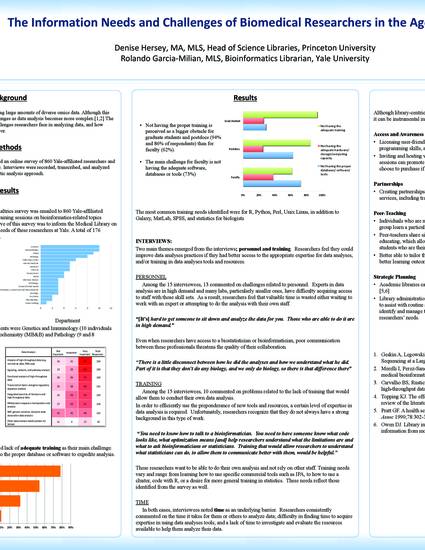
Presentation
THE INFORMATION/DATA NEEDS AND CHALLENGES OF BIOMEDICAL RESEARCHERS IN THE AGE OF OMICS
AAA Annual Meeting 2018
(2018)
Abstract
Background:High throughput technologies are rapidly generating large amounts of diverse omics data. Although this offers a great opportunities, researchers now need assistance in analyzing the large amounts of data they are generating in addition to access to more software options to analyze data. The purpose of this study was to identify the most common challenges researchers face in analyzing data, and how academic libraries can help them in this endeavor.
Methods: This study was designed as a multimodal needs assessment analysis, combining an online survey and in-depth one-on-one semi-structured interviews. Between January and March of 2016, the authors emailed an online survey to 860 Yale affiliated individuals who had registered for at least one training session offered through the Cushing/Whitney Medical Library’s bioinformatics program. In addition, Fifteen in-person interviews were arranged at a time and location chosen by the participant. Interviews were digitally audio-recorded, and each last about 30 minutes. The authors analyzed interview data using NVivo 10® according to the thematic analysis approach.
Results: Of the 860 individuals who received the online survey, 176 individuals responded for a 20.4% response rate. Overall, most the respondents (78%) identified lack of adequate training as their main challenge. The other most noted challenge was not having the proper database or software (54%) to expedite analysis. Individuals most often mentioned training for the R programming language and/or Python, RNA sequencing data analysis, and training on how to use specific commercial software tools. Two main themes which emerged from the interviews; personnel and training. Researchers feel they could improve data analyses practices if they had better access to the appropriate statistical expertise, and/or training in data analyses tools and resources. Researchers consistently commented on the difficulty in finding time to acquire expertise in using data analyses tools, and a lack of time to investigate and evaluate the resources available to help them analyze their data.
Conclusions: Academic libraries can be an asset to researchers who find data analysis to be a challenging process. Librarians can make researchers aware of the software and databases available to them by arranging for training sessions on the use of commercial products, inviting vendors to conduct workshops and provide trials. In addition, libraries can provide, or partner with other campus centers to hold training sessions on programming languages such as R and Python. Librarians can also help identify staff on campus who have a strong background in data analysis, and arrange for peer-instruction. Even if a library does not have the capacity or funding to purchase all necessary software, librarians can introduce these options to researchers who can choose to license or purchase them for their own labs. All of these opportunities support researchers who feel they do not have the time to pursue these opportunities on their own.
Keywords
- data management,
- omics,
- data analysis,
- information-seeking behavior
Disciplines
Publication Date
Winter January 22, 2018
Location
Austin, TX
Citation Information
Denise Hersey and Rolando Garcia-Milian. "THE INFORMATION/DATA NEEDS AND CHALLENGES OF BIOMEDICAL RESEARCHERS IN THE AGE OF OMICS" AAA Annual Meeting 2018 (2018) Available at: http://works.bepress.com/rolando_garciamilian/27/
